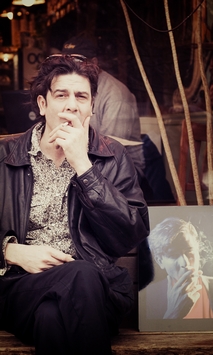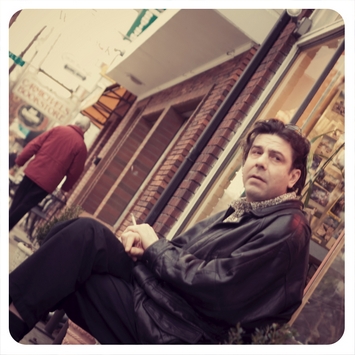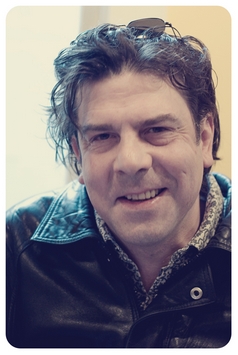social bookmarking tools:
 |
|
| Available RSS Feeds |
|---|
 - Top Picks - Top Picks |
 - Today's Music - Today's Music |
 - Editor's Blog - Editor's Blog
|
 - Articles - Articles
|
Add Louisville Music News' RSS Feed to Your Yahoo!
|

HEAD WEATHERMAN REDUX:
CATCHING UP WITH PAUL K. (10 YEARS LATER)
AUTHOR'S NOTE: All heading quotes come from a hurried transcription of select scenes from a DVD of the movie Glengarry Glen Ross. The author takes full responsibility for anything taken out of context in order to force a thematic fit to the following artist profile. It is also curious to note that a certain four-letter expletive is said a total of 138 times in that movie. The word occurred less than five percent of that amount during the interview of this artist and his cohort, a figure they should post somewhere in their studio, sort of like those signs outside a manufacturing plant that brag about how many days have gone by without an accident ("This Studio has Gone XX Hours Without Someone Dropping an F-Bomb!"). But, then, these guys weren't competing for a Cadillac Eldorado, a set of steak knives, or their jobs. And no one was told to put that coffee down.
"I'm here on a mission of mercy."
Worldwide Headquarters, Misison of Mercy Productions: it's in a renovated home in the Crescent Hill neighborhood of Louisville on a traffic-busy street that runs into Frankfort Avenue. The house once belonged to photographer Larry Birkhead, former lover of the late, sad Anna Nicole Smith and father of their daughter Dannielynn, now growing up somewhere in this city, hidden and safe from those who would suck away at her private life like remoras. You can stand at the master bedroom doorway and imagine: Smith did come to town for a couple of Derby parties not too long ago. Could some long-smoldering fire have been ignited in there?
Probably not. Nothing as supermarket-tabloid tawdry. Instead, upstairs in what used to be the house's attic is a home studio with recording decks on tables and shelves along one wall, a drum kit in front of a trio of narrow arched windows that overlook the street and a pair of microphone stands. Jason Bradley, the homeowner, is shoving slide faders up and down on a Korg mixing board, bringing up organ, bringing down drum in subtle increments. He looks down at a sheet of paper he has pulled from a binder as the song plays. It's a track listing, containing each instrument played and the track where it now resides on the machine.
The song that played was slow like a folk ballad infused with the passion of a Gospel. It started with a vocal:
You can call me a fool / You can call me a liar,
You can say that I'm a thief / And bring me no relief,
From this eternal fire
Behind it is burnished ambience, the famed wall of sound where it sounds as if there's air running throughout the music. During the bridge, a trumpet solo that is overdubbed with a harmony of itself. The tempo, the trumpet, the dour lyrics all touch back on "The Sun Ain't Gonna Shine Anymore," a huge hit in 1966 by a British band called The Walker Brothers that consisted of three guys from California who weren't related, but gave themselves the same last stage name. The song has the same forlorn sound, the same hint of drama without being as overdramatic.
You can say that I'm unclean / Or that I'm an unbeliever,
You can say that I'm cruel / A useless, broken tool,
An agent of the Great Deceiver
Next to Bradley, his tall form folded down into a chair, sits Paul Kopasz, the vocalist and songwriter, better known as Paul K. by his small collective of worldwide fans. Which isn't entirely an exaggeration. A recent eBay search revealed that his older recordings are being auctioned off by people in Australia, Austria, England, Germany and Canada. One of them is trying to sell a rare cassette version of L(c)ve is a Gas. Another touts that A Wilderness of Mirrors is actually the soundtrack to a movie.

"We try to strike a balance between low-fi and hi-fi with the best equipment we can get our hands on," Kopasz said of the recording he and Bradley were mixing. "We try to split the difference. And as a result, both sides hate us. We can't get on the radio and the hipsters think we're way too mainstream, too classic-rock sounding. You just heard a song we ripped-off the Marshall Tucker Band, for Chrissakes."
The song he described was "Whiskey Queen," from his forthcoming release (his 25th in a career that has spanned nearly two decades) currently under the working title C.I.A.O., short for Covers, Instrumentals, Anecdotes and Originals. And, yes, the song does have an Earth-shoe country vibe hijacked from 1977, when quilted shirts feathered bangs were the Look to Have, Man.
"The thing about this whole production," Kopasz said, "with drum machines and perfect timing and ProTools software and all this stuff, it's very easy to make a track perfect. They've been perfect for 20 years now. It's really hard to get something to sound like it's actually being played by real people with flesh on their bones and blood running through their veins.
"So when we record this stuff in obviously modest circumstances, that's a blessing and a curse. And the trick is to get it to sound good and clean enough, but still make it sound like it has flesh on the bones. You're not likely to hear that nowadays."
"Let me buy you a pack of gum. I'll show you how to chew it."
A decade ago, Paul Kopasz relocated to Louisville from Lexington, where he had become a star in its endogenic music scene as a regular performer at Lynagh's. Originally from Detroit, he'd come to the University of Kentucky on a debate scholarship. An instructor named J.W. Patterson, a cousin of Gram Parsons, got him interested in music. A few punk rock performances later, school ended quickly. He picked up his guitar and an on-and-off heroin addiction (now off for more than a decade) and traveled back to Detroit, up to New York, over into Europe, then back to Kentucky, writing and recording and releasing music on CDs and vinyl. His output was plentiful: The Killer in the Rain, The Big Nowhere, The Blue Sun, Blues for Charlie Lucky, Coin of the Realm, Now and At the Hour of Our Death (Amen), Stolen Gems, The Garden of Forking Paths, Achilles Heel. All were released either as solo works or with his band The Weathermen.
Prior to his move to Louisville, he had crafted a deal with independent label Alias. The first result was L(c)ve is a Gas, produced by Velvet Underground producer Mo Tucker, full of songs, both bitter and hopeful, reflecting his own challenges of ditching the smack habit and his search for some kind of redemption. His follow-up was his version of a rock opera, Wilderness of Mirrors, which told the story of a National Guardsman who's roused from his bed while making love to his wife to help clean up what he's told was aircraft wreckage. The year is 1947. The place is the desert outside Roswell, New Mexico. The wreckage is suspicious. Soon his farm's animals start dying. His wife finds out she has cancer. They travel to New York City and lose each other. She's dying in a ward in Bellvue Hospital. He's homeless, wandering the streets, searching for her.

Over the last decade, though, Kopasz has scaled back his output slightly, to maybe one album every 14 months instead of 12. In addition to his work as a staff writer and movie critic for LEO, he still performs and records, but his ambitions are justifiably tempered.
"I'm not trying to set the world on fire anymore," he confessed. "There was a time, of course. It's demographics and age and timing and stuff, but when I grew up I thought if I worked real hard on it, I could be Bruce Springsteen. We never wanted to be The Beatles or anything. When we started to realize how dark this stuff was and how it was such an acquired taste, then we started thinking we could be like the Velvet Underground and get famous 30 years later. That made sense. But we're still waiting."
But while he was trying to set the world on fire during his years in Lexington, a UK student used a fake ID to get into Paul K's shows at Lynagh's. Fifteen years later, the student would be his bassist and co-producer. The Murray to his Mitch (or vice-versa).
"I was a huge fan of his back in college," Jason Bradley said. "When I moved to Louisville in 2001, I was throwing darts with one my friends. He was playing a Tim Krekel album. I said there's another guy you should listen to. His name is Paul K. So I went out to the car and got L(c)ve is a Gas. My friend knew who he was. He went to his apartment and gave me Coin of the Realm on vinyl."
"I still have about 30 of those left," Kopasz added.
Bradley's friend, Dean Meyers, has a brother known as Frozen John, who has played with Paul K. Frozen mentioned that Kopasz was going to play in Evansville, a surprise to Bradley because he didn't know Kopasz still performed. He videotaped that show, then did the same for some others. One show, where Kopasz and band opened for Papa M, was taped, burned onto DVD and sold. And while he wasn't videotaping Paul K's performances, Bradley played in a punk band called The Stoner Moms.

Kopasz hired him as his bassist. The first show was a live radio performance as part of the run-up to the Lebowskifest.
"That terrified me," Bradley confessed. "It was the first time I had ever played with him."
Kopasz shrugged. "Radio's no different than any other gig."
"My God, I'm in the act of giving a gift away."
Kopasz and Bradley share production credit as Mitch and Murray under their Mission of Mercy Productions name, a reference to offscreen characters David Mamet's play Glengarry Glen Ross and it's film version starring Al Pacino, Alec Baldwin, Jack Lemmon and a handful of others. It's the story of four desperate, oily real estate salesmen hawking property in Florida. To spur the lack of sales, their home office, headed by two guys named Mitch and Murray, who are only spoken of and never seen, has set up a contest. Top seller gets a Cadillac Eldorado. Next down gets a set of steak knives. Third-place finishers are fired. At stake also are a bundle of premium leads that guarantee quick and profitable sales. The staff can only get those if they close the leads they have. Problem is, the leads are weak, consisting of people who have been pitched before and old people and Indians who just like talking to salespeople. In the film version, Alec Baldwin plays a mentally abusive, hard-assed motivator who comes into the office for a sales conference and proclaims he's on a mission of mercy from Mitch and Murray, then he hands them the news about the contest and their jobs.
If a Catch-22 puts you in a vicious loop that you can keep playing at forever, a Glengarry puts you in a solid no-win situation: you're fired unless you can do the impossible and close the hopelessly bad sales leads.
Or, in the case of musicians, sell several thousand units of your latest work to a constantly shrinking market.
In Glengarry, two of the salesmen strike back hard at the no-win scheme.
So did Kopasz and Bradley by offering every piece in the entire Paul K. catalog as a free download, hosted on Archive.org under a Creative Commons license, where the music can be taken and enjoyed as long as it's not being used commercially. So it's okay as long as someone doesn't swipe the whole catalogue and turn it into a K-Tel-type production with a name like The Dy-No-Mite Hit Sounds of Paul K that gets sold on the Home Shopping Network, along with The Many Mellow Moods of Paul K. and A Paul K Christmas.
"The entertainment business is so greedy and so bloated," Kopasz said. "And if we're going to be treated like s--, then let's flip them the bird and give everything to our fans for free. For somebody who wants a hard copy with artwork and stuff they can gaze at while they're stoned while they're listening to the record, we'll see them one. But for the most part, we're just putting it up there and saying take what you like. They're doing it anyway. A fish can only swim upstream for so long before it runs out of stamina."
The only release that isn't available for free is the three-disc set Panopticon, released last year. Each copy is truly one-of-a-kind, with hand-drawn cover artwork (by Kopasz or others, including a group of autistic students) and a prize inside, such as a rare boxing card or Russian postage stamps. The wraparound cover was made by cannibalizing the cardboard sleeve for Coin of the Realm. Each copy is hand-numbered. They sold for $30 apiece. Obviously, making it available now for free wouldn't set well with those who had just recently paid for it.
"I think one of the main points of putting this stuff up for free," Bradley added, "is I have a lot of other stuff, like live releases and mixes. When we record, we have a way of doing it and doing it well. So we can have a way to start giving away that stuff to people who like us. But I think the main point we're trying to make with it is that we're not gonna make money off the recordings anymore. We're going to make money off of playing out and getting people back into what it is to make music."
It's a long road with no turning, pally. Now let's go.
Now that he has settled comfortably far outside his Springsteenian Superstardom wish, Paul Kopasz keeps a consistent presence in town with a Wednesday-night gig at Air Devils Inn. It's a place with a certain clientele that fits him personally and musically.
"A large percentage of them are sad old drunks," he said. "But the thing I love about the place is that normally when I do solo acoustic gigs, I have a hard time getting upbeat numbers into the set. Mainly because I don't have any. Since the place is so sleepy, I'll just play whatever the hell I feel like, which ends up being one depressing dirge after another. And after all these years, it's the only club where nobody's given me any grief about playing too many depressing songs.
"If I had the money, I would buy the damn joint."
Buying a bar ranks high among male fantasies, somewhere below participating in a heist like the guys in Heat, but way above playing in a rock band. The fantasy most likely involves buying and running a place that's all wood and ferns with a Wurlitzer jukebox against the wall and half a dozen plasma TVs showing sports: a latter-day Cheers. Not someplace that always smells like unmopped beer in a damp basement, but consistently has the best of Louisville's musicians playing nearly every night.
"I told the owner a couple weeks ago that I've played some toilets in my day, but not one with a St. Vincent DePaul poor box by the front entrance. It's one of the most low-down places. And I love it."
In Fire in the Belly, philosopher Sam Keen suggested that marriage lets two people fall out of love and into reality. There's consistent, hard work involved, to be sure, but it's done to maintain a partnership based on love and respect and caring. The fantasy closes down. But desperation to maintain it, though, can kill to where the work becomes merely a scheme , like one where you try to sell land nobody is interested in buying just so you can get a set of steak knives or keep your job.
"There are no more yardsticks to use," Paul K. said, "or templates. At this point, we do it because we have fun. And it's like Levon Helm says in The Last Waltz, 'I just wanna break even.'"
Nearly the entire Paul K. (with and without The Weathermen or The Prayers) catalog is yours for the taking when you visit www.paulkweathermen.com and click the "listen" link. Or go to www.archive.org, click the Audio link and enter paul k in the search field.
Paul K. plays a solo gig every Wednesday night at Air Devils Inn.
